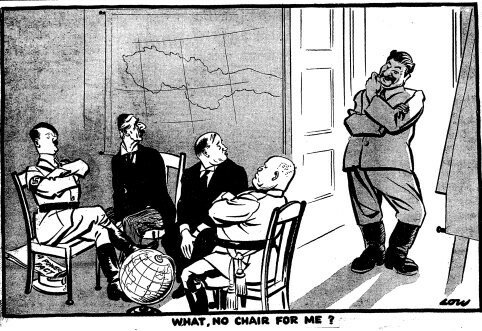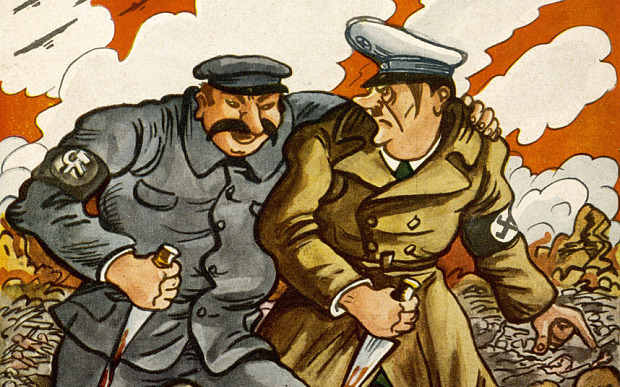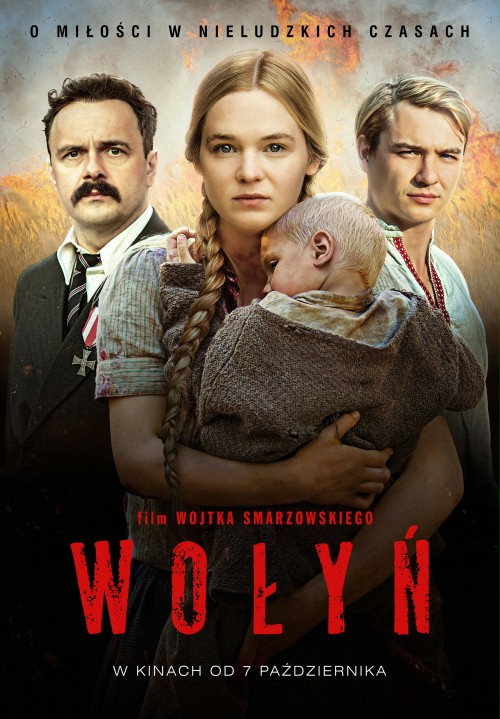Historians interpret and reinterpret history. It is a normal process… except when politicians do the reinterpreting. Their interests are not intellectual but rather political. They seek justification for their politics by evoking the past, history as they need it to be.
The origins and waging of World War II are of special interest to western politicians, past and present. This was true even early on. In December 1939 the British government decided to lay a white paper on the Anglo-Franco-Soviet negotiations during the spring and summer of that year to organise a war-fighting alliance against Hitlerite Germany. Foreign Office officials carefully picked out a hundred or so documents to show that they and the French had been serious about organising an anti-German alliance and that the USSR was principally responsible for the failure of the negotiations. In early January 1940 the white paper reached the stage of page proofs. Nearly everyone in London was impatient to publish it. All that was needed was the approval of France and the Polish government in exile. Much to the surprise of British officials, France opposed the publication of the white paper, and so did the Polish government in exile. This may also come as a surprise to present day readers. Why would French and Polish officials be opposed to a publication considered «good propaganda» by the British to blacken the reputation of the Soviet Union?
Let’s allow the French ambassador in London to explain in his own words. «The general impression which arises from reading [the white paper]», he wrote in a memorandum dated 12 January 1940, «is that from beginning to end the Russian government never ceased to insist on giving the agreement [being negotiated] the maximum scope and efficacy. Sincere or not, this determination of the Soviet government to cover effectively all the possible routes of a German aggression appears throughout the negotiations to collide with Anglo-French reluctance and with the clear intention of the two governments to limit the field of Russian intervention».
And the French ambassador did not stop there. He observed that critics who felt that the USSR had been forced into agreement with Nazi Germany by Anglo-French «repugnance» to make genuine commitments in Moscow would find in the white paper «a certain number of arguments in their favour.» The language used here was in the finest traditions of diplomatic understatement, but the Foreign Office nevertheless got the message. The more so because there was this further, telling irritatant to Gallic sensibilities that the documents selected for the white paper failed to show that they, the French, had been more anxious to conclude with Moscow than their British allies. What would happen, the French wondered, if the Soviet government published its own collection of documents in reply to a white paper? Who would public opinion believe? The French were not sure of the answer.
As for the Poles in exile, they could not much insist, but they too preferred that the white paper not be published. Even in those early days Polish exiles were not anxious to publicise their responsibilities in the origins of the war and their swift defeat at the hands of the Wehrmacht.
In fact, all three governments, British, French and Polish, had much to hide, not just their conduct in 1939, but during the entire period following Adolf Hitler’s rise to power in January 1933. The Soviet government was quick to ring the alarm bells of danger and to propose a defensive, anti-Nazi alliance to France and Britain. And yes, Moscow also made overtures to Poland. The Soviet commissar for foreign affairs, M. M. Litvinov, even hoped to bring fascist Italy into an anti-Nazi coalition. In Bucharest, the Soviet government made concerted efforts to gain Romanian participation in a broad anti-German alliance redolent of the Entente coalition of World War I.
Were all these Soviet efforts a ruse to dupe the west while Soviet diplomats secretly negotiated with Nazi Germany? Not at all, Russian archives appear conclusive on this point. The Soviet overtures were serious, but its would-be allies demurred, one after the other, except for Poland, which never for a moment considered joining an anti-Nazi alliance with the Soviet Union. Commissar Litvinov watched as Soviet would-be allies sought to compose with Nazi Germany. Poland persistently obstructed Soviet policy and Romania, under Polish and German pressure, backed away from better relations with Moscow. One Soviet ambassador even recommended that the Soviet government not break off all relations with Berlin in order to send a message, especially to Paris and London, that the USSR could also compose with Nazi Germany. The four most important French diplomats in Moscow during the 1930s warned repeatedly that France must protect its relations with the USSR or risk seeing it come to terms with Berlin. In Paris their reports disappeared into the files, ultimately unheeded. The greatest blow to collective security came in September 1938 when France and Britain concluded the Munich accords which sanctioned the dismemberment of Czechoslovakia. Neither Czechoslovak nor Soviet diplomats were invited to participate in the negotiations. As for Poland, it allied itself with Nazi Germany. «If Hitler obtains Czechoslovak territories,» said Polish diplomats before Munich, «then we will have our part too».

The greatest blow to collective security came in September 1938 when France and Britain concluded the Munich accords which sanctioned the dismemberment of Czechoslovakia
Could it be a surprise that after nearly six years of failed attempts to organise an anti-Nazi front, that the Soviet government would lose all confidence in the French and British governments and cut a deal with Berlin to stay out of a war, which everyone recognised was imminent? This was the Nazi-Soviet non-aggression pact signed on 23 August 1939. As for the Poles, in their hubris and blindness, they mocked the idea of an alliance with the USSR right up until the first day of the war.
The Nazi-Soviet non-aggression pact was the result of the failure of six years of Soviet policy to conclude an anti-Nazi alliance with the west and not the cause of that failure. The British ambassador in Moscow accused the Soviet government of «bad faith», but that was just Pot calling Kettle black. Even in the last days of peace, the British and French governments looked for a way out of war. «Although we cannot in the circumstances avoid declaring war,» said one British minister, «we can always fulfill the letter of a declaration of war without immediately going all out.» In fact, France and Britain scarcely raised a finger to help Poland when it was invaded on 1 September 1939. Having brought disaster on itself, the Polish government fled Warsaw after the first days of fighting, its members crossing into Romania to be interned.
If France and Britain would not help the Poles in their moment of desperation, could Joseph Stalin have reasonably calculated that the British and French would have done more to help the Soviet Union, had it entered the war in September 1939? Clearly not. The USSR would have to look to its own defences. No one should be surprised therefore that a few months later the French and Poles in exile would oppose publication of a white paper which could open a Pandora’s box of questions about the origins of the war and their failure to join an anti-Nazi alliance. Better to let sleeping dogs lie and hope that government archives would not be opened for a long time.

After the war, the west launched a campaign accusing Stalin of being Hitler’s «ally»
After the war, however, the fiasco surrounding the British white paper was long forgotten. The sleeping dogs awakened and began to bay. The west launched a campaign accusing Stalin of being Hitler’s «ally». In 1948 the US State Department issued a collection of documents entitled Nazi-Soviet Relations, 1939-1941, to which the Soviet government replied with Falsifiers of History. The propaganda war was on, as was the western especially American attempt to attribute to the USSR as much as to Nazi Germany the responsibility for setting off World War II.
The American propaganda was preposterous given the history of the 1930s as we now know it from various European archives. Was there ever a gesture of ingratitude greater than US accusations blaming the USSR for the origins of the war and covering up the huge contribution of the Red Army to the common victory against Nazi Germany? These days in the west the role of the Soviet people in destroying Nazism is practically unknown. Few are aware that the Red Army fought almost alone for three years against the Wehrmacht all the while demanding a second front in France from its Anglo-American allies. Few know that the Red Army inflicted more than 80% of all casualties on the Wehrmacht and its allies, and that the Soviet people suffered losses so high that no one knows the exact numbers, though they are estimated at 26 to 27 million civilians and soldiers. Anglo-American losses were trivial by comparison.
Ironically, the anti-Russian campaign to falsify history intensified after the dismemberment of the USSR in 1991. The Baltic states and Poland led the charge. Like a tail wagging the dog, they stampeded all too willing European organisations, like the OSCE and PACE and the EU Parliament in Strasbourg, into ridiculous statements about the origins of World War II. It was the triumph of ignorance by politicians who knew nothing or who calculated that the few who did know something about the war, would not be heard. After all, how many people have read the diplomatic papers in various European archives detailing Soviet efforts to build an anti-Nazi alliance during the 1930s? How many people would know of the responsibilities of London, Paris, and Warsaw in obstructing the common European defence against Nazi Germany? «Not many,» must have been the conclusion of European governments. The few historians and informed citizens who did or do know the truth could easily be shouted down, marginalised or ignored.

Western propaganda claimed that the Soviet Union and Nazi Germany were «allies». World War II was entirely their fault, while France, Britain and Poland were innocent victims of totalitarianism
Thus it was that Hitler and Stalin became accomplices, the two pals and the two «totalitarians». The Soviet Union and Nazi Germany were «allies». World War II was entirely their fault. France, Britain and Poland were innocent victims of totalitarianism. The OSCE and PACE issued resolutions to this effect in 2009, declaring 23 August a day of remembrance of the victims of the Nazi-Soviet «alliance», as if the non-aggression pact signed on that day came out of the blue and had no context other than totalitarian evil.
In 2014 after the US and EU supported a coup d’état in Kiev, a fascist junta took power in the Ukraine, and the propaganda campaign to falsify history intensified. Ukrainian Nazi collaborators like Stepan Bandera were made into national heroes. The Ukrainian paramilitary forces, the so-called Organisation of Ukrainian Nationalists and the Ukrainian Insurgent Army (OUN/UPA), which fought alongside the Wehrmacht and SS, were likewise transformed into forces of liberation.

After the 2014 putsch, Ukrainian Nazi collaborators like Stepan Bandera were made into national heroes
It looked like Poland and the Baltic states had gained an ally for their ugly anti-Russian campaigns. SS veterans paraded in the Baltic countries, and Polish hooligans vandalised Red Army graves while the Warsaw government bulldozed memorials to the Soviet liberators of Poland. Just this autumn Warsaw has attempted to control the thematic messages of a new museum of the Second World War being opened in Gdansk so that they conform to Polish government propaganda. The ruling Law and Justice Party wants to make Poland into a noble victim and the main story of World War II. In fact, Poland was a main story of the 1930s though not in any noble role. It was a spoiler of European collective security.
In October of this year the Polish and Ukrainian legislative assemblies passed resolutions vesting responsibility for World War II in Nazi Germany and the Soviet Union. Given Poland’s role in collaborating with Nazi Germany and obstructing Soviet efforts to create an anti-Nazi alliance in the 1930s, this resolution is surreal. Equally perverse is the Ukrainian equivalent resolution by a government celebrating Nazi collaboration during World War II.
Ironically, the the Law and Justice Partyhas its own troubles in its «alliance» with fascist Ukraine. Those Ukrainian collaborators, who fought with the Nazis and committed atrocities against Soviet citizens, also committed mass murder in Poland during the latter part of the war. As mightily as Poland seeks to falsify history, it cannot cover up the atrocities of Ukrainian Nazi collaborators against Poles, remembered in a recently released Polish hit film, «Volhynia». It looks like a poetic falling out amongst thieves who must bury the history of Ukrainian fascism and Nazi collaboration in order to unite against the common Russian foe. If only the numerous Ukrainians now living in southern Poland would stop putting up illegal monuments to remember Ukrainian Nazi collaborators. The poor Poles are caught between a rock and hard place. It is equally disagreeable to remember that the Red Army liberated Poland and stopped the atrocities of Ukrainian Nazi collaborators.

As mightily as Poland seeks to falsify history, it cannot cover up the atrocities of Ukrainian Nazi collaborators against Poles, remembered in a recently released Polish hit film, «Volhynia»
Will Russia and Poland finally bury the hatchet to rid themselves of the new wave of Ukrainian fascists in their midst? This is unlikely. The Polish government also had to choose in the 1930s between Nazi Germany and the Soviet Union. It chose collaboration with Nazi Germany and spurned an anti-Nazi alliance with the Soviet Union. No wonder history must be falsified. There is so much for western governments and Poland to hide.









